On election’s eve, on society’s margins
The elections find Roma, Ashkali and Egyptian communities impoverished and cast out.
Since the beginning of summer, if not earlier, social media was full of promises from candidates who were running for local elections. These have ranged from a cable car in Arbëri and a suggestion to replace the Fadil Vokkri stadium with an artificial lake, both in Prishtina, to organizing a “Miss Grandma” festival in Ferizaj. The candidates have been proposing solutions, sometimes concrete and other times strange, for the problems they’ve identified.
Just a few kilometers outside the main cities, but far off the radar of the leading political parties’ programs, Roma, Ashkali and Egyptian communities from Prizren, Ferizaj and Fushë Kosova are facing difficulties to secure their essential needs. From high unemployment and school dropout rates to the lack of drinking water and electrical poles that endanger locals’ lives daily, there is no solution coming from local or central governments. In their neighborhoods, solutions are offered only when votes are required, but it all stops with the end of the campaign.
Ten people from the Roma, Ashkali and Egyptian communities spoke with K2.0 about marginalization by local institutions. They voiced their needs and demands on the eve of elections in ten conversations about a country that boasts of its multi-ethnic character whenever the opportunity arises but that in arrogance fails to actually engage with these people.
A pitcher of brown water
Entering Fushë Kosova you can see, amidst the tall and colorful buildings of the city — most new, others still under construction — billboards for the local elections, showing the faces of candidates and the numbers of electoral lists.
Just after passing the roundabout that leads to the old town, Lagjja 29 lies to the left. However, you will never find it on Google Maps, as the application marks the place as “Te Maxhupt,” a derogatory expression for Roma, Ashkali and Egyptians.
The moment you enter the neighborhood the appearance of the city changes. There are no construction sites indicating development and there are no tall buildings either. At a corner there is a small market that sells bicycles, furniture and tools. There too is a small cafe, a place where residents, mainly older ones, meet and share their worries with each other.
On the first attempt to enter this quiet space — one apparently with an established clientele where everyone knows everyone — one of the locals who was drinking tea immediately told us that he does not want to talk because he “has nothing to say.”
Another local, Bedri Berisha, who was sitting alone with his face towards the market, invited us to sit next to him without hesitation. Before two minutes had passed Berisha was speaking about the water that they do not dare to drink.
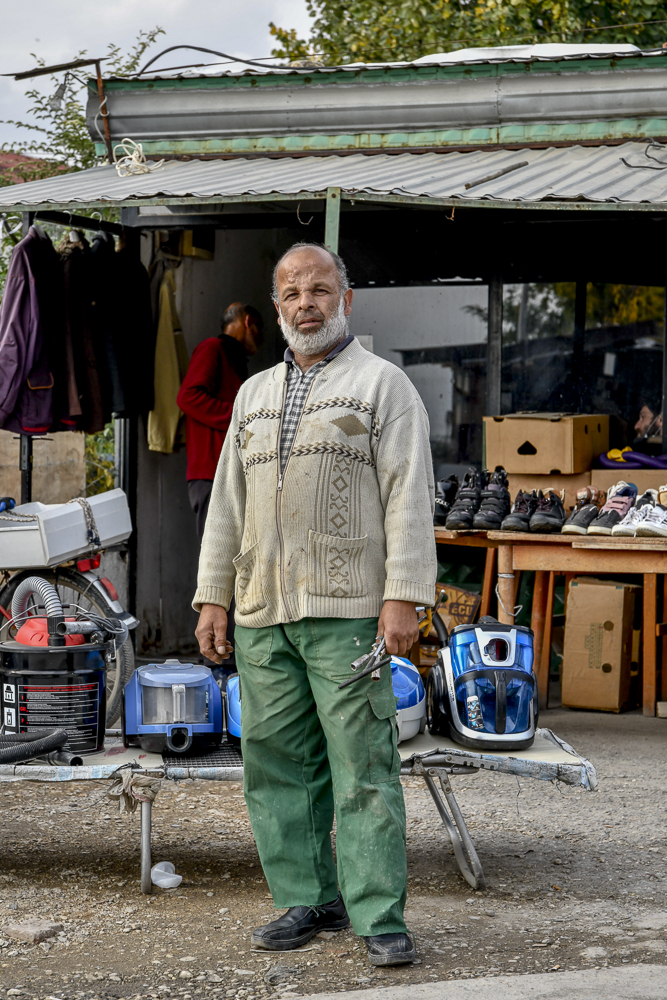
Bedri Berisha: “Before the elections they deceive us, a lot of promises, but after they get the votes, they do not even knock at our doors.”
Just two years ago, in June 2019, the mayor of Fushë Kosova, Burim Berisha, cut the ribbon on the city’s new drinking water system. It was a project that he named one of the “biggest projects in the post-war period” for the inhabitants of the municipality.
At the inauguration ceremony, he filled a pitcher with water. The mayor, alongside Valdrin Lluka, the then minister of Economic Development, and Ilir Abdullahun, the chief executive officer of the Prishtina Water Supply, filled glasses from the pitcher and they all toasted. At the event they begged the residents who now have water to not waste it.
The residents of Lagjja 29, which was called a “problematic community” by Mayor Berisha, said they don’t have anything to even waste since the water, which they call “coffee water” due to its color, is not only undrinkable but unusable even for cleaning.
“Shame that I didn’t take two bottles of water and send it to the mayor — because he says that this water is drinkable — and leave it in front of his office and say to him, drink this water,” said Bedri Berisha. “If it weren’t for the wells, we’d be done for.”
The same year the water system was inaugurated in Fushë Kosova, the director of the regional water company in Prishtina shook hands with a resident of Fushë Kosova and said that “you won’t have to carry water with your bicycles and use plastic jugs anymore.”
Before the inauguration of the water supply, the residents of Fushë Kosova had to supply themselves with water by carrying it in with plastic jugs and bottles. Although it seems this problem has been solved for Albanian residents, the mainly Ashkali residents of Lagjja 29 still have to bring their water in by this method. Sometimes they buy their drinking water at the store and sometimes they pay others to transport in large amounts all at once.
At the same cafe, next to Berisha’s table, was Remzi Krasniqi, who was listening carefully. After a time he joined the discussion.
Remzi Krasniqi: “What can we do, we have to put ourselves in a bad situation just to buy water, everything costs too much money."
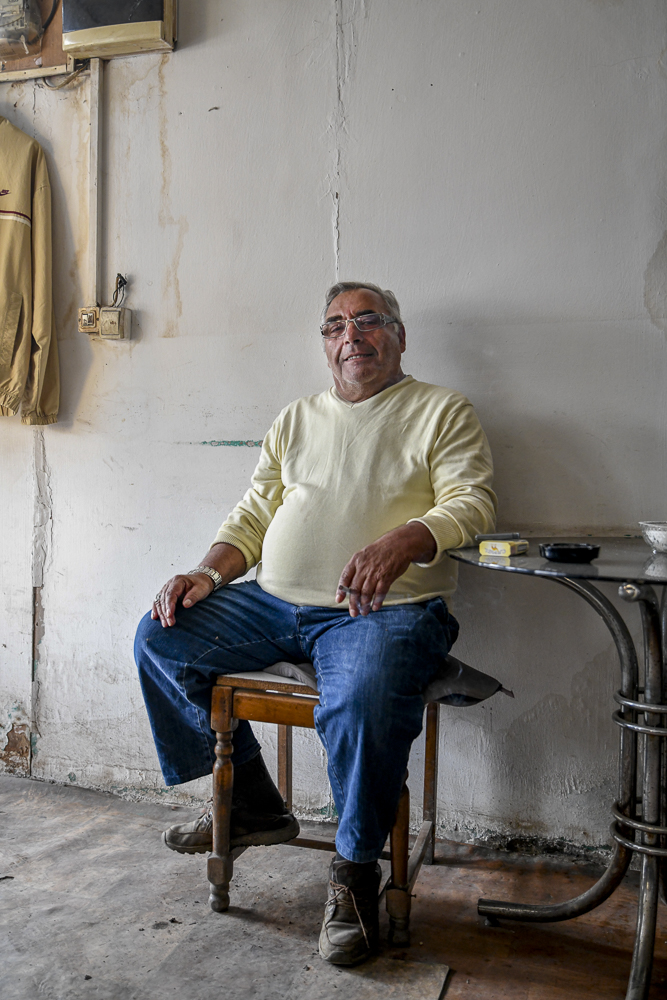
While Berisha has to pay for someone to transport his water in from other parts of Fushë Kosova, Obiliq and other nearby areas, Krasniqi buys it from the store, but to do so he has to give up other essential needs.
“What can we do, we have to put ourselves in a bad situation just to buy water, everything costs too much money,” he said. “For Albanian residents there is drinkable water, but here from ‘Maxhupt’ and onwards there isn’t,” he said, a reflection of the attitude the institutions have towards Ashkali.
Krasniqi said that even with the little money he has, he sometimes gives some to his neighbors, because he knows their struggles. One day, a child begged him for two euros to buy bread. Even in basic staples, they have to pick carefully between just potatoes, pasta, flour or beans, because as Krasniqi said, meat is only an option for Eid or for the New Year.
Asked whether he would vote, he answered, “No.” He said that he’s tired of periodic alms, of the distribution of chocolates to children and humanitarian packages before the elections. For 16 years he voted every time, but no one has helped him.
Berisha doesn’t expect anything from the elections, nor from the sudden road paving campaigns on the eve of elections.
“Before the elections they deceive us, a lot of promises, but after they get the votes, they do not even knock at our doors,” said Berisha.
Kenan Bajrami saw us and left his bicycle a few meters away and approached us on a street corner. Unlike Berisha and Krasniqi, Bajrami said that he will vote for the most just candidate, even though there are many complaints about the municipality and politicians of that area. He went straight to the topics of the lack of drinking water, unemployment and dirt in the neighborhood.
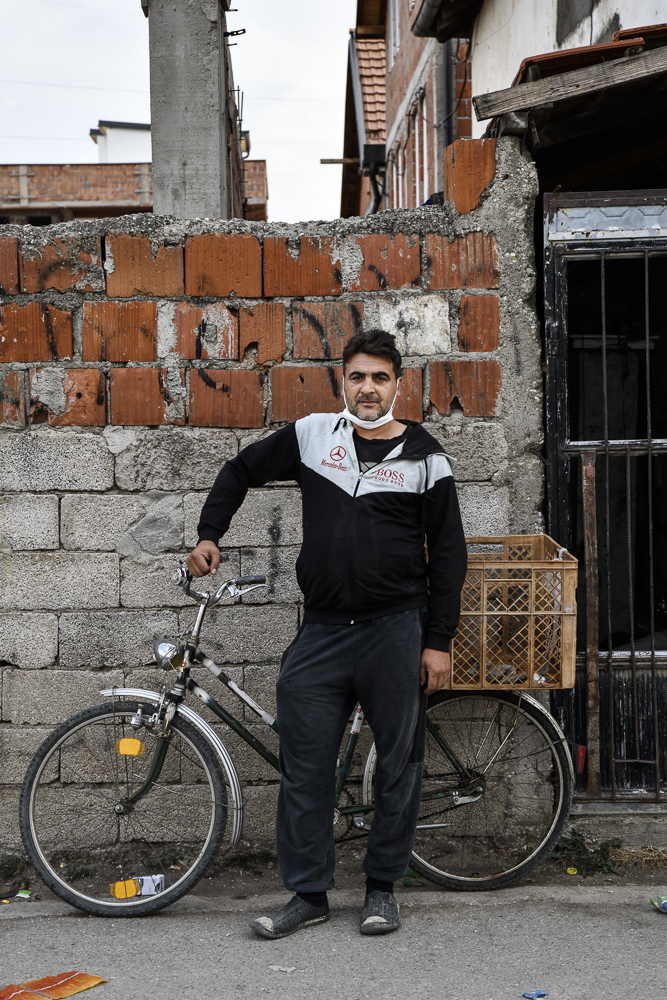
Kenan Bajrami: ‘‘They say, we will come, we will come, but they never do.”
Bajrami, 41, does not expect that the problem of drinking water will be solved because, according to him, they have been to the municipality several times about the problem and although the relevant officials have told them “We will come, we will come,” nothing has improved so far.
Bajrami works collecting cans, which he then sells, earning three to five euros per day. “With social assistance,” he said, his family of five manages to survive.
Elfete Tatari, 61, another resident of Lagjja 29, said that they have no water and that most of the time they have to pay someone to transport in a large supply of bottles of drinking water to last the month.
In old age and with chronic hypertension and diabetes, life is already quite difficult for her. To add to those worries, her family relies on her pension and her son’s low salary.
In Tatari’s backyard, along with the table and chairs, there is another object, an electrical pole with tangled wires next to the orange wall of the house.
Tatari, who lives with six family members, fears that her house may burn down and that her grandchildren may be injured due to the danger of the electrical pole. “My second son spoke about this on TV, he begged the institutions to get rid of the electrical pole, but they haven’t done anything,” she said.
Elfete Tatari: "My second son spoke about this on TV, he begged the institutions to get rid of the electrical pole, but they haven’t done anything."
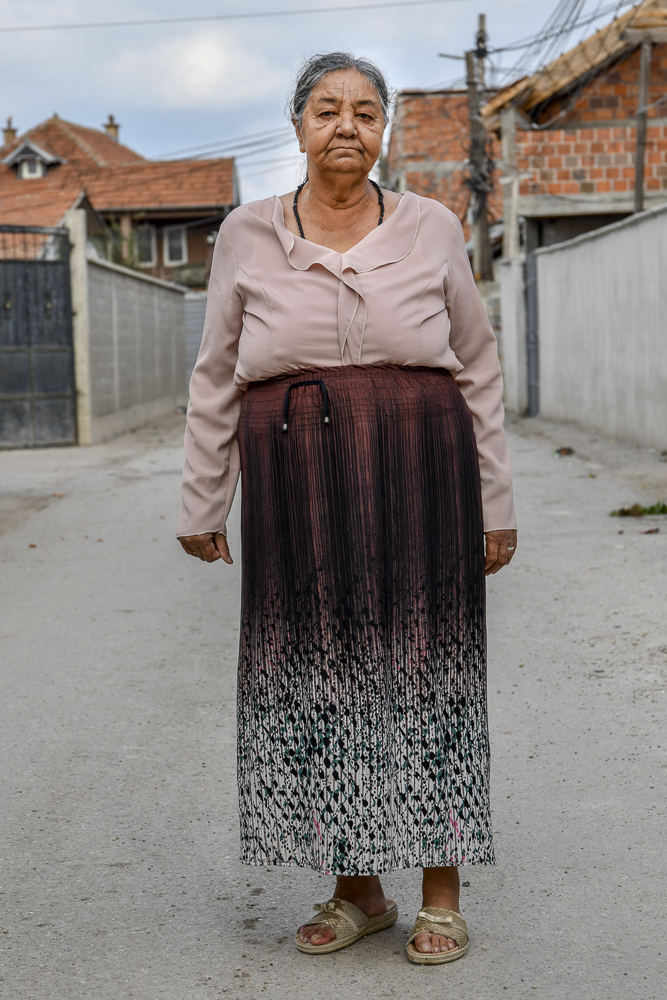
Ferizaj, the (dis)united city
Hundreds of people from Ferizaj gathered at the inauguration of the “Union of the City” underpass. On the evening of July 8, 2021, the head of the municipality, Agim Aliu, said in front of the crowd, “this day is a feast day for Ferizaj,” and that the 6 million euro project was done because “Ferizaj owed it to its citizens to not divide the people and the economy into two sides [split by the railroad track.]” According to Aliu the project, completed less than three months before the October 2021 local elections, surprised even skeptics who had said it was just a dream.
Reflecting Aliu’s great enthusiasm for the project, he made sure there were glamorous ceremonies, cameras and media, and even concerts to inaugurate its opening.
Although this project attracted a lot of attention across the media and social networks — to the point that it became a meme — Hamide and Faruk Bajrami, who live less than three kilometers from the underpass, were not part of the inauguration ceremony. They did not attend the concerts nor did they engage with the project on social media. Even in our conversations with them, they hardly mentioned this supposedly monumental project that cost millions of euros.
The couple has other worries, other demands and other expectations of the local government and, above all, they do not believe that the city’s residents and economies have somehow become united — even though they mention that the municipality headed by Aliu has done some good work.
Over the last 20 years, Hamide and Faruk have established their family in a one-story house in the Sallahane neighborhood, which is mainly inhabited by Ashkali.
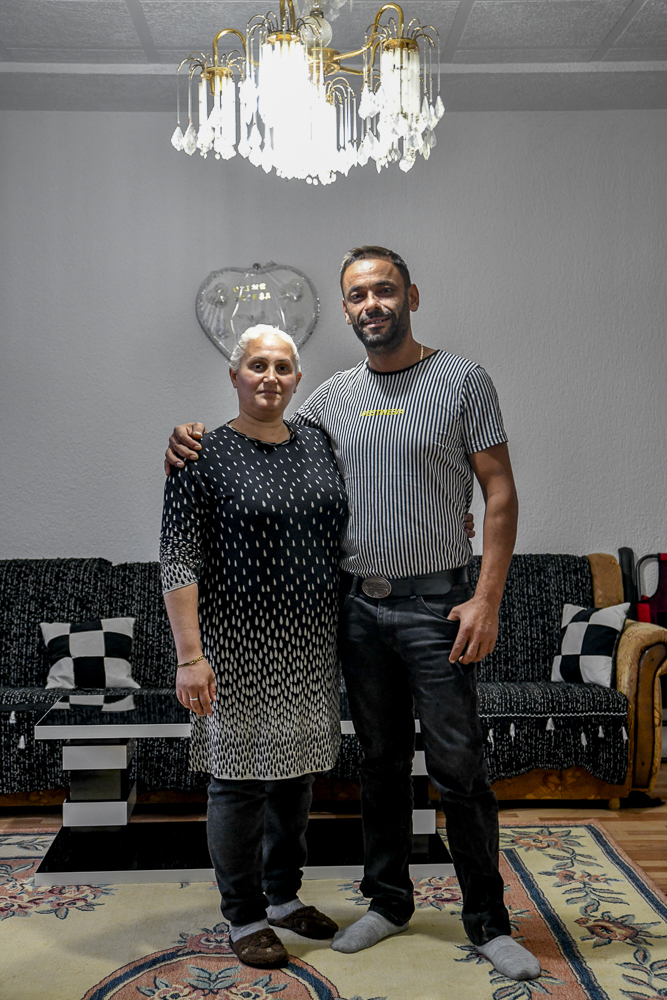
Hamide Bajrami: “If I only had my children in kindergarten, I would have been working for sure.”
Faruk Bajrami: spent several years eating his lunch separately from his colleagues, as they discriminated against him because of his ethnicity. “After some time, the things changed because I started to do them favors (did their work).”
They say their lives have been filled with stories of ethnic discrimination, economic difficulties and lack of access to the public goods that Ferizaj offers. The only income the family had over the years was Faruk’s earnings from work at a sheet metal factory in a village outside the city.
Faruk said that for several years he ate his lunch separately from his colleagues, as they discriminated against him because of his ethnicity.
“After some time things changed, because I started to do them favors,” he said, adding that it was there where he learned the craft of metalworking, which worked out for him well later. It has been several years since he opened a small sheet metal workshop and with the income he supports his family. He also employed his cousin in the workshop, a cousin whom he raised together with his wife after the boy’s parents died years ago.
Hamide never had the chance to work as she had to take care of the children. She mentions the difficulties her children had in attending classes when the learning process was conducted online. Since March 2020, teaching has been conducted mainly online due to government measures to prevent the spread of Covid-19.
Local or central institutions have occasionally assisted low-income families by providing electronic devices. Research shows that people from the Roma, Ashkali and Egyptian communities have had the greatest difficulty in providing their children with access to online learning, and that children from these communities have largely been absent from the learning process during this time. Among them were the Bajrami’s children who had not received any assistance from the municipality of Ferizaj.
The only possibility for their children to attend online was through Faruk’s cousin’s phone, or when Faruk lent him his phone during one-hour breaks.
The Bajrami’s neighbor, Senad Komorani, has a complaint against the municipality as well. Komorani, 21, who works in an orchard, said that the head of the local government in Ferizaj has never visited their neighborhood in the last four years. The lack of investment in his neighborhood has left it with few opportunities for social life.
“There’s no need to go somewhere where I already know I’m going to be rejected. Because of the color of our skin, we can not enter a cafe,” said Komorani, suggesting that they can’t frequent other locales in the city, including youth centers, because they feel discriminated against. “The neighborhood of the Maxhup, that’s what they call this neighborhood,” he said.
According to him, there were promises that a stadium would be built in the Sallahane neighborhood which would have helped his community to integrate.
“Near the river, that’s where they promised to build the stadium, but it never happened. “Whoever has visited us or has come we have told them we need [the stadium],” said Komorani. Along with the stadium, they were promised a youth center. He said that his friends mostly spend their time at a bar where they play video games, pool or foosball.
The bar where he and his friends spend time often turns into a music venue where they gather to share verses, or even make plans for recording songs. Recently, the group, which call themselves “Sallahane 05,” has become big on social media for their rap music.
Komorani said that another problem is employment, which is connected to racial discrimination against them. According to him, the municipality has not taken any steps to solve this problem.
Senad Komorani: “They let us work in the back of shops but go and check if you can find any of us working the cash register."
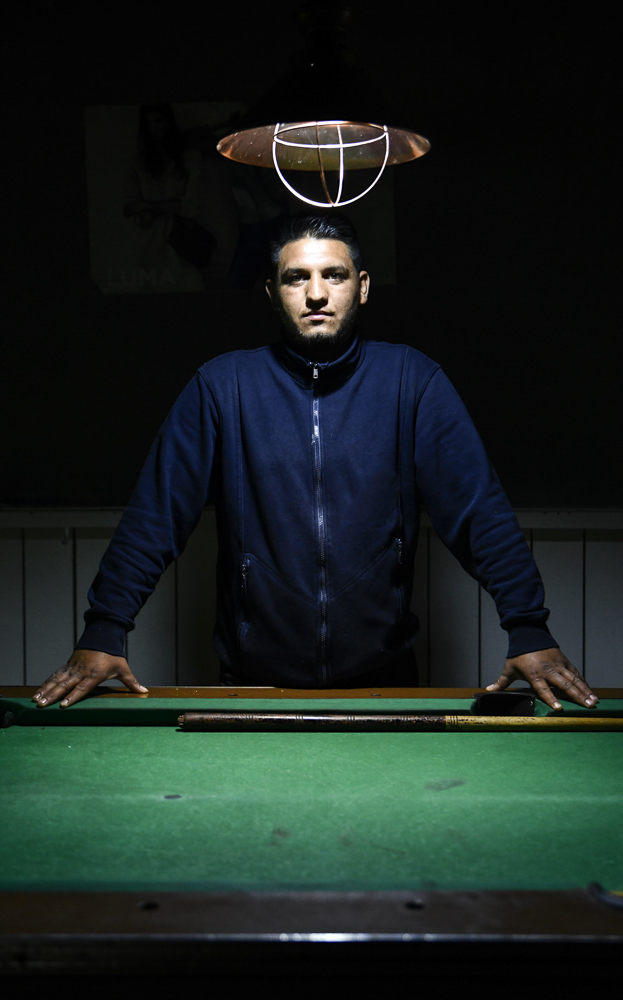
“They let us work in the back of shops but go and check if you can find any of us working the cash register.”
Komorani doesn’t expect anything from the October local elections, but he will continue to take part in the elections, even though he doesn’t know who or what to vote for.
Hamide Bajrami also had thoughts on neighborhood investments. Her concern is that she hasn’t had a chance to work outside the home because of the lack of a kindergarten.
“If only the children were in kindergarten, I would have been working for sure,” she said.
Although marginalized groups are exempt from paying kindergarten fees, they are often not admitted due to the limited number of children admitted to public kindergartens.
Citizens only in elections times
When we entered Prizren’s Terzi Mahalla neighborhood, inhabited largely by Roma, a truck blocked the road. Anyone who wanted to pass had to squeeze against the walls of the buildings, or get ready to enter backyards, because the road is too narrow for both people and trucks.
A white-collar worker was roaming the neighborhood trying to offer residents microcredit loans. “There is a lot of interest here in the loans,” he told us when our paths crossed. Extreme poverty is a uniting factor for Roma, Ashkali and Egyptian communities throughout Kosovo. That might be why this neighborhood’s residents are targeted by such financial institutions, which usually have fewer bureaucratic requirements for lending and higher interest rates.
There we met Muhamet Alibajro, 48 years old, who was waiting outside his house for his son.
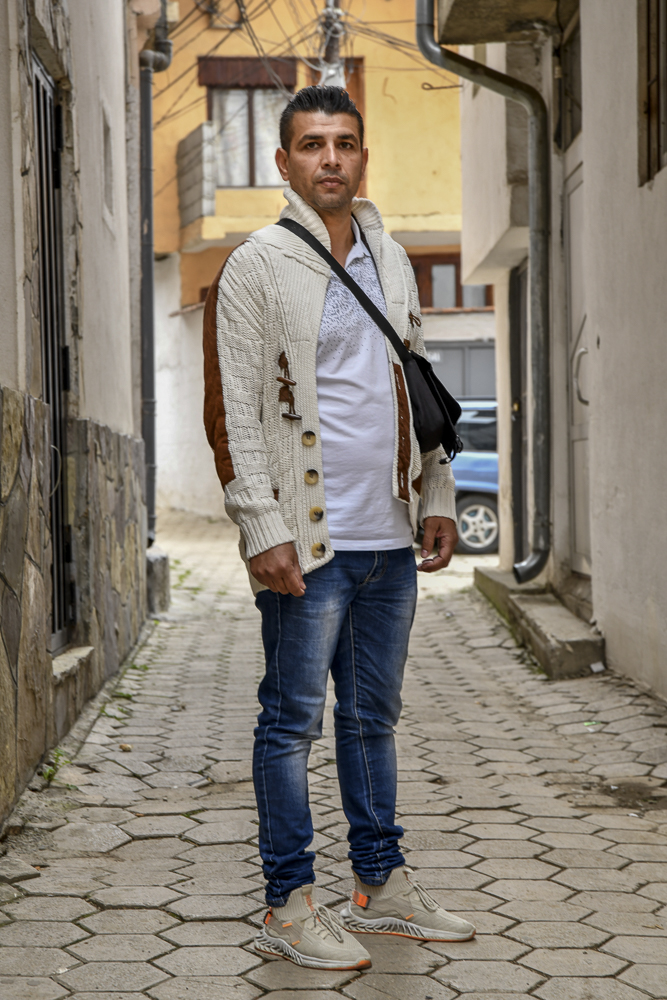
Muhamet Alibajro: "They say look at how the maxhupt are dressed, they do not have shoes and jeans. Have they ever asked how I could get a uniform? It costs 33 euros. Where can I get all that money to buy it, from social assistance?"
“I will only speak when things are changed, and not just speak for the sake of speaking,” Alibajro said.
Alibajro lives far away, in Germany, but this distance has not detached him from the daily worries of the family and the community he left behind in Kosovo. As he started talking about Terzi Mahalla, the first thing he mentioned were the ubiquitous black cables that connect houses on both sides of the road, connecting houses like a web.
He said that dozens of times the residents have called the relevant institutions to come and look at the electric poles that burn out or catch fire when it rains. The arrival of the rainy and snowy seasons means an increased risk that the houses of the poor will burn down, said Alibajro. The trouble with electric cables worries him a lot, because he knows how things would play out if a house burns down. The words of the institutions would be, according to Alibjaro, that “it doesn’t matter, a maxhup’s child is dead or maxhupi have died.”
The discrimination against the inhabitants of Terzi Mahalla, which according to Alibjaro leads to a lack of basic services for the neighborhood, is making their daily lives more difficult. This treatment is also apparent in schools, where Roma children are judged for lacking uniforms.
“They say look at how the maxhupt are dressed, they do not have shoes and jeans,” he said. “Have they ever asked how I could get a uniform? It costs 33 euros. Where can I get all that money to buy it, from social assistance?”
Alibajro said that he is tired of empty words. He said he has faced the rudeness of reality many times, where the elderly do not have access to health, children do not have school bags, and young people can not go to work due to nepotism, therefore he is secure in his decision not to vote.
The only thing that would make Alibajro change his mind would be if someone approached him and asked him directly why things are the way they are.
Right after the conversation with Alibajro, a young man Mikail Cana invited us for coffee. While the waiter in the neighborhood cafe was serving coffee, Mikail mentioned that he doesn’t know anyone else from the neighborhood who has worked as a waiter. He said most of the young people in the neighborhood work in car washes and have difficulty finding other jobs, for example as waiters, because “actually, they look bad.” Although he himself feels respected broadly across Prizren, he does not think that his peers receive the same treatment.
Mikail Cana: “They lied to us a lot; I don’t care anymore. I even deleted all the online newspapers from my Facebook account.”
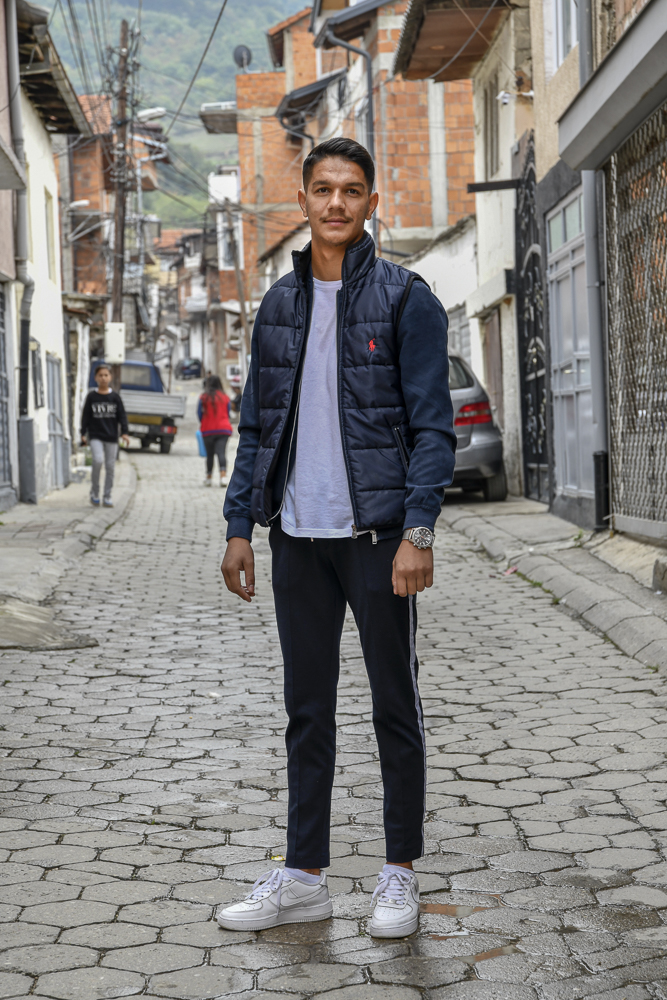
However, he says he no longer cares about these problems.
“They lied to us a lot; I don’t care anymore. I even deleted all the online newspapers from my Facebook,” said Cana. While speaking about his plans to move to Switzerland, he told us that in the neighborhood he plans to leave behind, it isn’t just electrical poles, but the street lights don’t work either and the lights flickering off and on “looks like a disco ball.”
Another resident of Terzi Mahalla is Gjyla Shopi, 78, who is deeply concerned about the future of the youth.
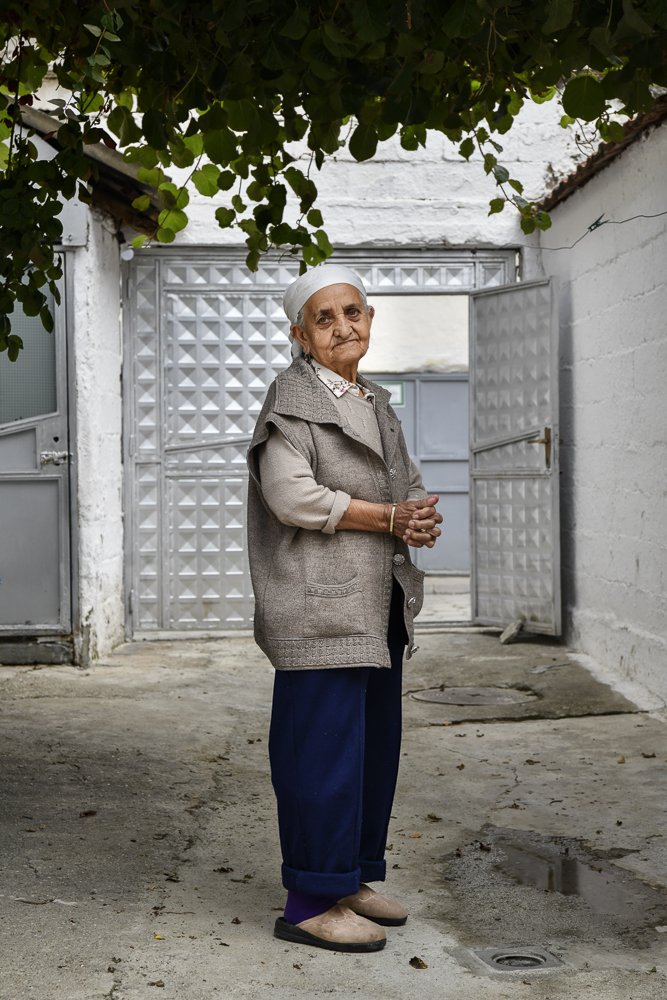
Gjyla Shopi: “I hope [politicians] do something for the youth, not for me, an old lady, because my days have passed.”
Shopi lives alone — her sons have migrated abroad — but doesn’t complain. She didn’t want to understate the help she received from her neighbors who are practically the only ones who knock at her door or help her. Whenever she needs help, the neighbors take her to the doctor. The neighbors also sent her to get the Covid vaccine and will take her to vote as well.
That she has already experienced enough in her life is clear when she talked about her expectations from the elections. Alone in old age, she holds the deep desire that one day the situation will improve for the youth.
“I hope [politicians] do something for the youth, not for me, an old lady, because my days are gone,” said Shopi.
Feature Image: Atdhe Mulla / K2.0
![]()

This article has been produced with the financial support of the “Balkan Trust for Democracy,” a project of the German Marshall Fund of the United States and the Royal Norwegian Embassy in Belgrade. Opinions expressed in this article do not necessarily represent those of the Royal Norwegian Embassy in Belgrade, the Balkan Trust for Democracy, the German Marshall Fund of the United States, or its partners.
- This story was originally written in Albanian.


